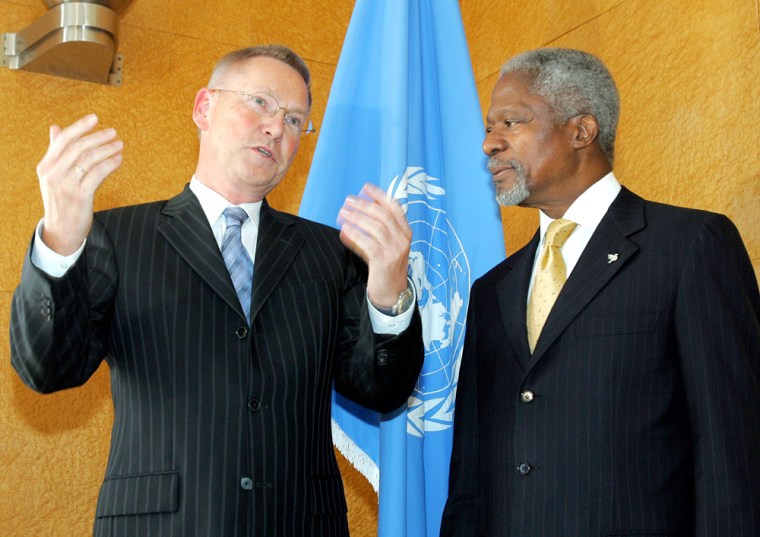U.N. Secretary-General Kofi Annan said Monday he is determined to keep an upcoming report into the assassination of former Lebanese Prime Minister Rafik Hariri from fanning tensions between Syria and Lebanon.
Annan also said there had been no “serious discussion” about widening the probe into Hariri’s death to include the recent suicide of a Syrian official who effectively controlled Lebanon for 20 years.
Interior Minister Ghazi Kenaan, one of at least seven Syrians recently questioned by a U.N. team about Hariri’s death, was found dead in his office Wednesday. Syria’s opposition claimed Kenaan could have been killed to cover up top-level involvement in Hariri’s death.
The Lebanese opposition has accused Syria of playing a role in Hariri’s Feb. 14 death in a car bombing, allegations Damascus repeatedly has denied. Annan said he expected to receive a report on the investigation into the slaying on Friday.
“I know there has been lots of political commentary and lots of discussions about it but from where I sit, I’m determined to make it as technical as possible and not allow a politicization of the process,” Annan said.
The investigators, led by German prosecutor Detlev Mehlis, have named four pro-Syrian Lebanese generals as suspects and questioned seven Syrian officials, one of whom — Interior Minister Ghazi Kenaan — committed suicide last week. Annan told reporters there had been no “serious discussion” of widening the probe to investigate Kenaan’s suicide.
Also Monday, French police announced the arrest of a former Syrian intelligence officer accused of giving false testimony to Mehlis’ probe. Mohammed Zuhair Al-Siddiq was detained on a Lebanese warrant Sunday and likely would be extradited.
Details of the claims against him were not clear. The Beirut newspaper Al-Mustaqbal alleged that Al-Siddiq was an accomplice in the planning and execution of the bombing that killed Hariri. The newspaper is owned by the Hariri family.
Lebanon wants assassination probe extended
Annan said he will wait to answer a Lebanese request that the probe be extended by another two months until after he gets the report. On Thursday, Lebanon’s government requested that the probe be prolonged until Dec. 15.
“Let me say that I have spoken to Mehlis, but I will wait for his full report to be able to make a judgment whether to extend the mandate or not,” Annan said. “And if we do extend the mandate, what specifically will it entail and what will they need to do.”
Hariri’s death led to massive demonstrations against Syria and magnified the international pressure on Damascus to withdraw its troops, which it eventually did. The Security Council approved a probe into Hariri’s assassination on April 8.
Annan gave the investigation a three-month mandate when it began its work June 16 but said it could be extended by three months if necessary. In August, Mehlis had requested and received an extension beyond the original Sept. 15 deadline.
Britain’s U.N. Ambassador Emyr Jones Parry said the council would reserve judgment until it receives the report.
“The next thing we do is respond to that report and the advice we’re given, but as of now, none of us have a clear indication of what is in the report,” he said.
No negotiations with the U.S., Syria says
Meanwhile, Syria on Sunday denied a British newspaper report that it was negotiating with the United States in an effort to end its isolation in return for a “list of painful concessions,” including blocking the flow of foreign fighters into neighboring Iraq.
Information Minister Mahdi Dakhlallah told reporters on Sunday that Syria did not accept the “logic of deals” because the country’s positions are “known for everyone and it defends them through realistic and flexible policy.”
Also, the official Syrian Arab News Agency quoted an unidentified foreign ministry official as saying that Syria was ready for “constructive dialogue” but without conditions.
On Saturday, The Times reported that the Bush administration had offered Syria’s President Bashar Assad a deal to end his regime’s isolation — intensified by Hariri’s assassination — “if Damascus agrees to a long list of painful concessions.”
